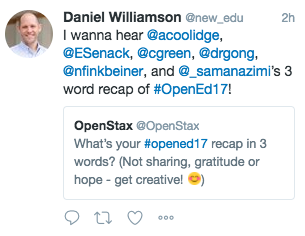I don’t tend to do post-conference reflections. Mainly because I crash hard after conferences, and while I did that with OpenEd 17 I also feel like I have some brewing thoughts and questions that need to be shared, or perhaps need to be shared with myself – a post-conference self-reflection piece.
Post by Amanda Coolidge, Senior Manager, Open Education
This morning Daniel Williamson sent me a tweet asking what my 3-word recap for Open Ed 17 would be.

He encouraged creativity in the 3 words. After some thought I came up with:
- Women
- Transparency
- Keynotes
So this is where my self-reflection begins. Why did I choose those 3 words?
Women
The highlight of the conference was being a participant on the @Uncommon_women panel. What a privilege to be seated next to Sarah Cohen, Kelsey Merkley, and Francesca Carpenter and in front of a room that was FULL of both women and men eager to discuss women in leadership. I so appreciated the constant conversation that was taking place throughout the room, it didn’t feel like a panel, it felt more like a group of friends gathering for coffee, discussing real issues, and being vulnerable.
One question that I keep reflecting back on was from Katie Steen. She asked, “What advice do you have for young, early career females?” (Side note: If you were in the session you know that I was rather surprised to know that I was being asked advice because I really thought I was still in the category of young and early career). My response to Katie was to be true to your values, be confident in knowing what you want, find people in leadership whom you admire and seek their feedback- in fact, ask them if they would consider mentoring you. When you find someone you trust, respect, and can look to for advice- stick with them. (Shout out to Mary Burgess, I’d start a coffee shop with you). As well, ensure that whoever you work with is respectful of YOU. You deserve respect and if you are in a position where that is not being valued, stand up, say something and if that doesn’t work, move on to the next gig. The bonus of being early in your career is that you are EARLY in YOUR CAREER- which means you shouldn’t feel limited, stretch yourself, challenge yourself, apply for the job, and most importantly stick to your values.
The issues of women in leadership and women working in Open Education are not new, in fact, Karen pointed out after the session that this is a topic and a struggle that has been ongoing for years. Of course, at that point, I found myself a bit dismayed. Years? WTF society- why is this an ongoing issue? Why has the inclusion of women at the table been a struggle? Equal pay- seriously WHY are we still talking about this? Women as CEOs and as mothers – can’t we be both? Women who may not have the traditional feminine energy/nurturing nature – really? You are going to call them bitchy?
I want this conversation to continue. I want to see similar panels or conversations or presentations at events. I want women in our field to lift each other up, not put each other down. We need to mentor one another, listen, and be empathetic to ALL voices. And at the end of the day, if you are the only woman at the table- channel your inner Chrystia Freeland (Canada’s Minister of Foreign Affairs) and wear the damn bright red dress and make it obvious that you ARE the only woman at the table.
Transparency: Two women and Cengage

While my third word is keynotes, I want to highlight Cathy’s final keynote as one of the most transparent talks I have ever heard. By transparent I mean she put it all out there. She called out the elephant in the room, the fact that for the past few years there has been growing concern that perhaps the open movement isn’t following its values. That while we talk about inclusion and diversity, we aren’t activists in ensuring that inclusion and diversity are at the forefront of our work. We talk. We don’t act. Cathy laid out all of the challenges and she eloquently described the history of the open education movement, the OER movement, where it originated, where it has evolved, and where we need to go. She gave both a shout out to the #UnCommon Women panel and to SPARC’s conference DEI Guide– which if you are organizing an event is a must read.
Another talk I attended that was incredibly transparent and vulnerable was by Mary Burgess. (Yes, another shout out to my fearless leader). Her talk titled “Wolves in Sheeps Clothing” was incredibly real and by real I mean, it was human. She didn’t throw up figures, numbers, or charts, she told a story about what it means when you are doing REALLY good work and members of the community discredit your work by suggesting it isn’t important. She reminded all of us in the room that it is okay to criticize and critique but do so in a respectful manner, we are humans after all. We all have feelings, and we do this work because we believe in it. Regardless of where your interests lie in open education, we are all doing this together and we can only achieve great results if we are together in this endeavor and if we treat each other with respect and gratitude.
Both Cathy and Mary exemplified transparency in their talks. They were honest, authentic, and vulnerable. Let’s stop shying away from the truth of what is happening- let’s be OPEN in our discussions.
The third area of transparency that hit a chord with me was the Cengage talk. First off, yes it was a good talk. It is clear that Cengage know their stuff and they used all the right catchphrases. Learner-focused, access, backward design, instructional design, faculty empowerment, low cost. Yes, they have the terminology down and by all accounts, it appears that they are moving forward with OER in the right way. However, the one area that lacked transparency was “when will the content be openly available?” As in, when can I access the content, that you say is available for the public, and re-use the OER for my own purpose?
Answer: We are working on that.
Here is where I question the transparency of the Cengage talk. Really? If you are committed to open and the 5Rs and the values of the community, then ensuring that the materials are openly available and accessible at the start is vitally important. As my friend Lena Patterson so wisely wrote in her blog post “Publishers serve themselves: we serve the public”.
Keynotes
As I already mentioned I loved Cathy Casserly’s final keynote and my notes are above regarding my reflections. Two additional keynotes that I have continued to reflect on are Ryan Merkley’s opening keynote and the student panel. A few takeaways from Ryan’s kick-off keynote, “Open has to be about more than the 5Rs. It is also about our values: access, equity, innovation & creativity.” I appreciated Ryan’s calling out of the values in open. We seem to have forgotten these values in some of the work we are doing, specifically with regards to access and equity. When we are designing our OER are we considering the student who can not see, who can not read, who does not have internet access, who is juggling multiple jobs and therefore needs access to the resources on a mobile-friendly device. Or are we designing for the privileged? Do we make assumptions about our audience? Do we make assumptions as to the faculty member’s intention? We need to start designing our resources for the many, not the select few. He added, “Education is about equity. So we have to talk about the forces that oppose it, injustice, privilege, exclusion”. We have to talk about the forces that oppose it and we have to continue to be advocates for the underprivileged. Cathy’s final keynote was a perfect bookend to this talk. In addition, Ryan’s keynote reminded me of what Aaron Schwartz wrote in the Guerilla Open Access Manifesto, “Those with access to these resources — students, librarians, scientists — you have been given a privilege. You get to feed at this banquet of knowledge while the rest of the world is locked out. But you need not — indeed, morally, you cannot — keep this privilege for yourselves.”
The students. Seriously, can we talk about the students? One word comes to mind after their panel presentation- humbled. The students from Santa Ana College were transparent and authentic. As they spoke about their experience in education they described being single parents, having multiple jobs, and financial struggles. And how did OER affect them? Access. Not only was the low cost a significant reason why they love OER but also the fact that they were able to access materials in multiple formats- from anywhere! I also was incredibly inspired by their dedication to their education, their belief that furthering their education was the next step for them. My heart ached when one student said: “I hope my education brings me into the middle class”. We need to remember these students. We need to honour them in our work. We need to be reminded that access and equity and being involved in a social justice movement is at the core of the work in open education. Thank you to the students of Santa Ana College for your time, your dedication, and your honesty in sharing your stories with 700 strangers.
Thank you to all of the volunteers and organizers of OpenEd17. Thank you to David Wiley for listening to the community when there was concern about the first keynote selection and for making a change in the programming.
Learn more:
Join us at an upcoming event:
-
Facilitating Learning Online (FLO) – Synchronous – Oct 23 – Nov 10, 2017 – FULL – sign up for the waitlist
-
Fall ETUG Workshop – Oct 27, 2017
-
Symposium 2017 – Nov 6, 2017
-
Facilitating Learning Online (FLO) – Design – Nov 13 – Dec 8, 2017 – FULL – sign up for the waitlist
-
Festival of Learning 2018 – May 28-30, 2018
